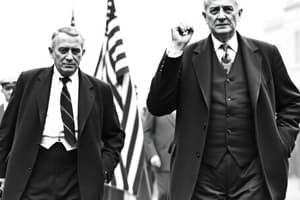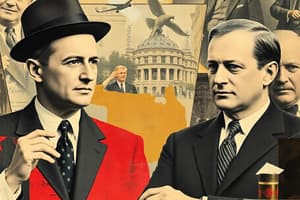Podcast
Questions and Answers
What was the aim of the Immigration Act of 1924?
What was the aim of the Immigration Act of 1924?
- To favor Eastern European immigrants
- To promote unrestricted European migration
- To abolish immigration quotas
- To restrict immigration based on national origins (correct)
Which agricultural crops were provided federal price supports under the Budderfield-Owen Farm Bill?
Which agricultural crops were provided federal price supports under the Budderfield-Owen Farm Bill?
- Potatoes, tomatoes, and carrots
- Rice, sugarcane, and soybeans
- Barley, oats, and rye
- Wheat, corn, and cotton (correct)
What major outcome resulted from the Washington Conference (1921–22) initiated by President Harding?
What major outcome resulted from the Washington Conference (1921–22) initiated by President Harding?
- Expansion of territorial ambitions
- Increase in arms race
- Enforcement of militarization
- Agreements to reduce naval armaments (correct)
What were the positive outcomes of Republican dominance in national politics during the 1920s?
What were the positive outcomes of Republican dominance in national politics during the 1920s?
How did the Immigration Act of 1924 impact European migration?
How did the Immigration Act of 1924 impact European migration?
Who won the presidency in 1920 with a significant victory, receiving 60% of the popular vote and 404 electoral votes?
Who won the presidency in 1920 with a significant victory, receiving 60% of the popular vote and 404 electoral votes?
In which year did Warren G. Harding assume office as President of the United States?
In which year did Warren G. Harding assume office as President of the United States?
Which Democratic candidate lost to Calvin Coolidge in the presidential election of 1924?
Which Democratic candidate lost to Calvin Coolidge in the presidential election of 1924?
Which President of the United States promoted economic growth through foreign trade and aimed to reduce government intervention in business affairs?
Which President of the United States promoted economic growth through foreign trade and aimed to reduce government intervention in business affairs?
Who succeeded Warren G. Harding as President after his untimely death?
Who succeeded Warren G. Harding as President after his untimely death?
Study Notes
National Politics in the 1920s: A Decade of Republican Dominance
The 1920s marked a period of prominent Republican control over national politics in America. This era is often referred to as the Golden Age or the Roaring Twenties due to its prosperity and cultural changes. As we delve into this decade's political landscape, let's explore key aspects related to the dominant Republican Party.
Election Results
In 1920, Warren G. Harding won the presidency with a landslide victory against Democrat James Menton Cox. Harding received 60% of the popular vote and 404 electoral votes. In contrast, Republicans fared less well in 1924 when Calvin Coolidge was elected president despite receiving a majority of the electoral college votes; he only garnered 382, losing nine states to Democratic candidate John W. Davis. Nonetheless, the Grand Old Party maintained a stronghold throughout the entirety of the 'twenties.
Presidents of Note
Warren G. Harding held office from 1921 until his untimely death in 1923. He sought to reduce government intervention in business affairs and to decrease taxes while promoting economic growth through foreign trade. His administration faced several scandals that marred his reputation posthumously. Coolidge succeeded him and served from 1923 to 1929. Under his leadership, the economy flourished, and unemployment rates dropped significantly. Herbert Hoover assumed the White House after Coolidge declined to seek reelection. Although Hoover's term began during a time of great prosperity, it would ultimately lead to the Great Depression of the following decade.
Key Issues and Policies
During the 'twenties, two significant pieces of legislation were passed under the auspices of Republican administrations—the Immigration Act of 1924 and the Budderfield-Owen Farm Bill. The former aimed to restrict immigration by establishing quotas based on national origins, effectively limiting European migration and favoring Western Europeans. Conversely, the latter established federal price supports for crops such as wheat, corn, and cotton, providing stability to agricultural markets.
Another notable policy in this era was the Washington Conference (1921–22), initiated by President Harding. It resulted in agreements among major powers to reduce naval armaments, limit militarization, and enforce territorial status quo.
Overall, the Republican dominance in national politics during the 1920s had both positive and negative outcomes. While the country experienced unprecedented economic growth and international accord, scandals tarnished politicians' reputations and laid the foundation for subsequent challenges.
Studying That Suits You
Use AI to generate personalized quizzes and flashcards to suit your learning preferences.
Description
Test your knowledge on the Republican party's control over national politics in America during the 1920s. Explore election results, notable presidents, key issues, and policies that shaped this era of Republican dominance.




